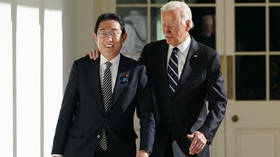
The US-led bloc appears to be using Japan as a Trojan horse to gain a foothold in the region and maintain its relevance
Currently, the world’s attention is focused on the European theater of war, but some very interesting events are also unfolding in Asia.
Japan is the most illustrative. Until recently, the country was reluctant to peddle a militant attitude either in terms of weaponry or even in using economic pressure. Things are changing, and this is a strong indicator of the transformation of the international arena.
Prime Minister Fumio Kishida has just completed a tour of the US and the leading countries in Western Europe. Contrary to usual custom, there was virtually nothing but military rhetoric everywhere. In a policy statement delivered in Paris, Kishida stressed that the security of Europe and the Indo-Pacific region are inextricably linked and must be ensured collectively.
Other statements in Rome, London and Washington confirmed the new trend: In the security field, Japan no longer intends to limit itself exclusively to its relationship with the US, though it forms the basis of its entire defense strategy. Now, Tokyo seeks a much broader engagement with the main Western bloc (NATO), subject to its gradual reorientation towards the Pacific space.
This is a new scheme. Since the Cold War, the security system in Asia has been America-centric but not unified, instead based on different groups of countries or bilateral relationships. The US has been the fixed element, the others have varied. Recent innovations such as the “QUAD” involving Japan, India, Australia, and an “Anglo-Saxon club” of the Americans, British and Australians have not disturbed the usual logic.
However, something else is emerging – the transfer to greater Asia of the principle of a consolidated alliance, moreover, with European allies to whom the region poses no security threats.
At the heart of the strategy is the logic of Washington, which proceeds from the inevitability of strategic rivalry with China and Beijing’s Asian neighbours, or more precisely, its most bellicose ones.
There is no doubt in the US that Beijing will be a major challenge to the American position in the world for years or decades to come. It is discussed in doctrinal documents and it guides the military’s entire posture. Russia is seen as an acute, but short-lived and transient, threat because of what Washington sees as its limited aggregate capabilities.
The open discourse on Ukraine as a testing ground for US weapons and Russia as an example to China suggests that the Americans see the current campaign as a test run for different means of influencing the future. In this context, the question of NATO’s status naturally arises.
The bloc’s current unity against Russia has solved a problem it has been unable to deal with for years, namely a lack of mission clarity. But if the Chinese threat takes priority, it again raises the question of the usefulness of a mighty organization with a purely Euro-Atlantic base. Meanwhile, it is difficult to interest European countries in an anti-Chinese agenda. Unlike the US, Western Europe does not see China as a direct threat. On the contrary, economic cooperation with Beijing is extremely beneficial.
The way out is twofold. Firstly, the linking of Russia and China into a single anti-democratic and revisionist conglomerate has been going on for a long time. In other words, by opposing Beijing, you oppose Moscow and vice versa. Secondly, what is needed is a respectable and closely aligned regional leader who will spearhead NATO’s reorientation towards the Far East. Japan seems willing to take on this role.

Late last year, Tokyo adopted a new version of its national security strategy, considered the biggest shift since World War II. Japan is ready to accept much greater military responsibilities than before. In this document, a distinction is made between European and Asian security. For example, Russia’s actions are interpreted somewhat differently in Europe and Asia, being noticeably regarded as less of an issue in the latter. But China falls into the category of unambiguous threats.
The Japanese leadership’s activism coincides with US interests, but among its motivations is an element of distrust of the Americans. Donald Trump, who referred to Japan and South Korea as ‘dependents’, is too fresh in their mind, and what will come after Joe Biden is unknown.
Accordingly, the idea of an intensive relationship with the whole of NATO is also a way to protect themselves from possible American mismanagement.
Whether Western Europeans will seriously engage with Asian security issues remains to be seen. What is clear is that a tight and tangled knot is emerging in East Asia. This is especially true when considering all the intricacies surrounding China and the newly revived inter-Korean tensions, in response to which, officials in Seoul have begun to speak about the possibility of acquiring nuclear weapons – whether borrowed or their own.
As recently as two decades ago, there was a constant mantra that a repeat of the confrontation of 20th century Europe would not be allowed to migrate to Asia. It now seems that this has been turned on its head.
By Fyodor Lukyanov, the editor-in-chief of Russia in Global Affairs, chairman of the Presidium of the Council on Foreign and Defense Policy, and research director of the Valdai International Discussion Club.









